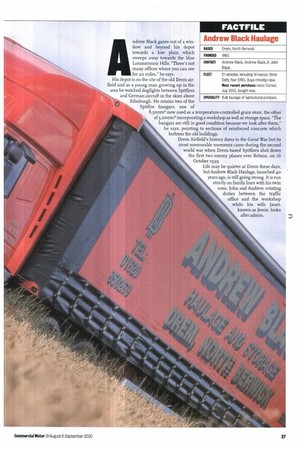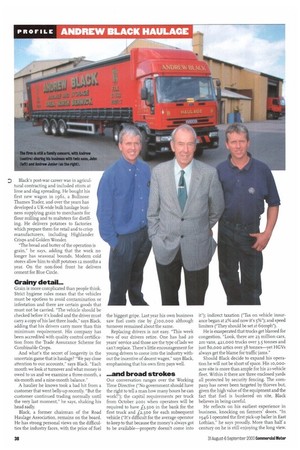A ndrew Black gazes out of a window and beyond his depot
Page 39

Page 40

If you've noticed an error in this article please click here to report it so we can fix it.
towards a low plain which sweeps away towards the blue Lammermuir Hills. "There's not many offices where you can see for zo miles," he says.
His depot is on the site of the old Drem airfield and as a young man growing up in the area he watched dogfights between Spitfires and German aircraft in the sides above Edinburgh. He retains two of the Spitfire hangars, one of
8,500m2 now used as a temperature-controlled grain store, the other of 5,000m2 incorporating a workshop as well as storage space. "The hangars are still in good condition because we look after them,"
he says, pointing to sections of reinforced concrete which buttress the old buildings.
Drem Airfield's history dates to the Great War but its most memorable moments came during the second world war when Drem-based Spitfires shot down the first two enemy planes over Britain, on 16 October r 939.
Life may be quieter at Drem these days, but Andrew Black Haulage, launched 40 years ago, is still going strong. It is run ' strictly on family lines with his twin sons, John and Andrew, rotating duties between the traffic office and the workshop while his wife Janet, known as Jessie, looks after admin. Black's post-war career was in agruultural contracting and included stints at lime and slag spreading. He bought his first new wagon in 1961, a Bullnose Thames Trader, and over the years has developed a UK-wide bulk haulage business supplying grain to merchants for flour milling and to maltsters for distilling. He delivers potatoes to factories which prepare them for retail and to crisp manufacturers, including Highlander Crisps and Golden Wonder.
"The bread and butter of the operation is grain," he says, adding that the work no longer has seasonal bounds. Modern cold stores allow him to shift potatoes 12 months a year. On the non-food front he delivers cement for Blue Circle.
Grainy detail...
Grain is more complicated than people think. Strict hygiene rules mean that the vehicles must be spotless to avoid contamination or infestation and there are certain goods that must not be carried. "The vehicle should be checked before it's loaded and the driver must carry a copy of his last three loads," says Black, adding that his drivers carry more than this minimum requirement. His company has been accredited with quality control certification from the Trade Assurance Scheme for Combinable Crops.
And what's the secret of longevity in the uncertain game that is haulage? "We pay close attention to our accounts," says Black. "Each month we look at turnover and what money is owed to us and we examine a three-month, a six-month and a nine-month balance."
A haulier he knows took a bad hit from a customer that went belly-up recently. "But the customer continued trading normally until the very last moment," he says, shaking his head sadly.
Black, a former chairman of the Road Haulage Association, remains on the board. He has strong personal views on the difficulties the industry faces, with the price of fuel the biggest gripe. Last year his own business saw fuel costs rise by Lic)o,c>c)0 although turnover remained about the same.
Replacing drivers is not easy. "This week two of our drivers retire. One has had zo years' service and those are the type of lads we can't replace. There's little encouragement for young drivers to come into the industry without the incentive of decent wages," says Black, emphasising that his own firm pays well.
...and broad strokes
Our conversation ranges over the Working Time Directive ("No government should have the right to tell a man how many hours he can work!"); the capital requirements per truck from October 2o()1 when operators will be required to have £3,5c,c, in the bank for the first truck and £2,50(3 for each subsequent vehicle ("It's difficult for the average operator to keep to that because the money's always got to be available—property doesn't come into it"); indirect taxation ("Tax on vehicle insurance began at 2% and now it's 5%1; and speed limiters ("They should be set at 6omph").
He is exasperated that trucks get blamed for congestion. "Look, there are 23 million cars, 2/T1 vans, 421,0= trucks over 3.5 tonnes and just 8c,,00() affics over 38 tonnes—yet HGVs always get the blame for traffic jams."
Should Black decide to expand his operation he will not be short of space. His ic),000acre site is more than ample for his 21-vehicle fleet. Within it there are three enclosed yards all protected by security fencing. The company has never been targeted by thieves but, given the high value of the equipment and the fact that fuel is bunkered on site, Black believes in being careful.
He reflects on his earliest experience in business, knocking on farmers' doors. "In 1946 I operated the first pick-up bailer in East Lothian," he says proudly. More than half a century on he is still enjoying the long view.












































































































